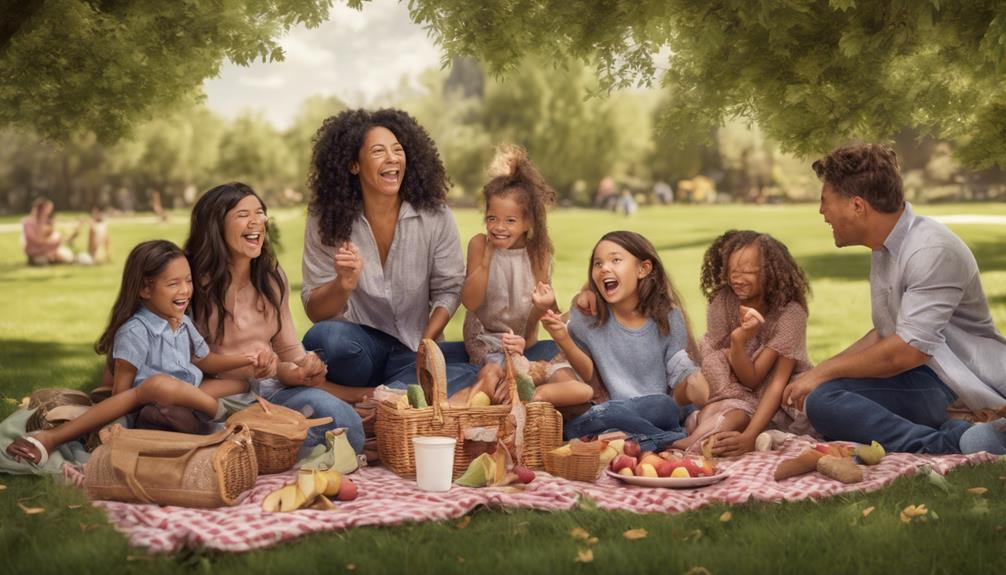As we navigate the complexities of children coping with divorce, we discover the top 3 tips that can make a significant difference in their journey towards healing and adaptation.
Understanding the Impact of Divorce is the first step in equipping ourselves with the knowledge to provide effective support to children.
Building Emotional Resilience and Nurturing Healthy Coping Mechanisms are essential components that lay the groundwork for positive outcomes in the face of this life-altering event.
Stay tuned to discover practical strategies that can aid children in finding stability and emotional well-being during this challenging period.
Key Takeaways
- Encourage open expression of feelings and validate emotions.
- Create a safe environment for children to share concerns.
- Teach coping strategies like deep breathing and journaling.
- Develop problem-solving skills to handle difficult situations.
Understanding the Impact of Divorce
Understanding the impact of divorce on children is crucial for parents and caregivers to provide the necessary support and guidance during this challenging time. Children may struggle with their emotions, behavior, and academic performance when dealing with their parents' divorce.
It's essential for parents to make sure their kids understand what's happening and feel supported throughout the process. Spending quality time with children, listening to their concerns, and offering reassurance can help them cope better with the changes.
Parents can also seek input from teachers or other professionals at school to gain a better understanding of how their children are coping with the divorce. By maintaining open communication and a positive relationship with their children, parents can create a stable environment that promotes emotional well-being.
Avoiding conflict and inconsistency post-divorce can significantly reduce the negative impact on children. Remember, children are resilient, and with the right support and understanding, they can navigate through this tough time with strength and grace.
Building Emotional Resilience

Encouraging children to openly express their feelings and validating their emotions is essential for building emotional resilience during the challenging process of divorce. Creating a safe environment where kids can talk about their concerns and fears openly can help them navigate the emotional rollercoaster that often accompanies divorce. By teaching children coping strategies like deep breathing exercises or journaling, they can learn to manage stress and anxiety more effectively.
Additionally, helping children develop problem-solving skills equips them with the tools to handle difficult situations they may encounter during the divorce process.
Supporting children in maintaining a positive self-image and self-esteem is crucial. Emphasizing their strengths and abilities throughout the divorce transition can boost their confidence and emotional well-being. By fostering an environment where children feel heard, understood, and supported, they can develop the resilience needed to cope with the challenges divorce brings. Remember, validating their emotions and providing coping mechanisms are key steps in aiding children through this tough time.
Nurturing Healthy Coping Mechanisms
To cultivate healthy coping mechanisms in children going through divorce, it's important to provide them with various outlets to express their emotions and engage in activities that promote positive well-being. Children cope better when they can express their feelings openly and feel validated in their experiences. Here are some ways to nurture healthy coping mechanisms:
- Encourage children to express their feelings through art, journaling, or talking to a trusted adult to help them process emotions.
- Engage children in physical activities or hobbies they enjoy to promote positive coping mechanisms and reduce stress.
- Provide a stable and supportive environment at home to help children feel secure and build resilience during the divorce process.
- Teach children relaxation techniques such as deep breathing or mindfulness exercises to manage anxiety and emotional distress.
- Offer reassurance and validation to children, letting them know it's okay to feel upset or confused about the divorce and providing comfort when needed.
Frequently Asked Questions
How Children Can Cope With Divorce?
Children can cope with divorce by maintaining open communication with parents and expressing their feelings. Seeking support from friends, family, and professionals can aid in the adjustment process. Providing stable routines and validating emotions are crucial.
What Is Most Important in Helping Children Cope With Divorce?
Helping children cope with divorce necessitates prioritizing emotional support, fostering open communication, and maintaining stability. Their well-being is paramount, and empowering them through involvement and professional help can aid in their resilience and healing.
How Preschoolers and School Aged Children Cope With Divorce?
Preschoolers and school-aged children cope with divorce by needing stability, reassurance, and honest explanations. They may exhibit regression, ask questions, or struggle socially. Open communication and routines help them feel secure through the changes.
What Are 4 Main Areas of Child Behavioral Difficulty That May Result From Divorce?
Divorce can trigger behavioral challenges in children, like increased aggression, anxiety, academic struggles, and social difficulties. It's crucial to provide support and understanding in these areas to help kids navigate these tough times successfully.
Can the Coping with Divorce Class Tips Help Protect Children from a Narcissistic Parent During Divorce?
The Coping with Divorce class tips can be crucial in protecting children from a narcissistic parent during a divorce. These tips can provide valuable guidance on how to navigate the challenges of co-parenting with a narcissistic ex-spouse, ultimately helping to shield children from emotional harm and manipulation.
Conclusion
In the journey of helping children cope with divorce, remember to be their guiding light through the stormy seas of emotions. Like a sturdy ship, provide them with the tools to navigate the rough waters and emerge stronger.
By fostering a safe harbor of love, understanding, and support, we can help them weather the challenges and find their way to calmer shores ahead.
Together, we can help them sail through this turbulent time with resilience and strength.










